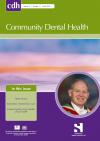Community Dental Health

- Cover Date:
- March 2015
- Print ISSN:
- 0265 539X
- Vol:
- 32
- Issue:
- 1
School-based intervention for improving the oral health of children in southern Thailand
© BASCD 2015 doi:10.1922/CDH_3474Petersen
School-based intervention for improving the oral health of children in southern Thailand
P.E. Petersen, J. Hunsrisakhun, A. Thearmontree, S. Pithpornchaiyakul, J. Hintao, N. Jürgensen and R.P. Ellwood
Objective: A two-year study assessed the benefit of an enhanced oral health promotion program combined with a closely supervised tooth brushing program in schools, using toothpaste containing 1,450 ppm F- and 1.5% arginine, on oral health and dental caries. Methods: 15 southern Thailand schools and 3,706 pre-school children were recruited: 8 schools with 1,766 children as controls; 7 schools with 1,940 children in the intervention groups. Of the intervention schools five were classified as cooperative school and two as non-cooperative schools, based on the criteria of 80% participation in the prescribed tooth brushing activities. Results: The DMFT and DMFS increments (“enamel and dentineâ€) were 1.19 and 1.91 for the control group and 1.04 and 1.59 for the intervention groups. These represent 12.6% and 16.8% reductions in caries respectively. The DMFT and DMFS increments (“dentine thresholdâ€) were 0.26 and 0.44 for the control group and 0.19 and 0.29 for the intervention group, representing 26.9%, and 34.1% reductions in caries incidence respectively. For the more cooperative schools the benefits were greater: up to a 40.9% reduction in caries for DMFS (“dentine thresholdâ€). At the 24 month examination there were significant improvements in dental plaque scores with greater improvements seen in the intervention group, greater still in the cooperative schools. Conclusions: This study documents the positive effect from use of fluoridated toothpaste (1,450 ppm Fand 1.5% arginine) administered by schoolteachers and undertaken via an enhanced school oral health program. Optimising oral health interventions for young children in Thai schools may have a significant impact on caries incidence resulting in reductions of up to 34% reductions in caries for all schools included in the study and up to 41% for the most cooperative.
Key words: health education, disease prevention, dental caries, fluoride, arginine, oral health, Thailand, tooth brushing
- Article Price
- £15.00
- Institution Article Price
- £
- Page Start
- 44
- Page End
- 50
- Authors
- P.E. Petersen, J. Hunsrisakhun, A. Thearmontree, S. Pithpornchaiyakul, J. Hintao, N. Jürgensen, R.P. Ellwood
Articles from this issue
- Title
- Pg. Start
- Pg. End
- Comparing lifecourse models of social class and adult oral health using the 1958 National Child Development Study
- 20
- 25
- Barriers to providing oral health care to pre-school children– differences between paediatric dentists’ and general dental practitioners’ beliefs
- 32
- 38
- Health economic analyses of domiciliary dental care and care at fixed clinics for elderly nursing home residents in Sweden
- 39
- 43
- Tooth brushing among 11- to 15-year-olds in Denmark: combined effect of social class and migration status.
- 51
- 55
- The incidence and nature of complaints against dentists for the treatment of children in Israel from 1992–2011
- 56
- 59
